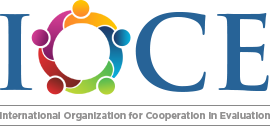Professionalization
Did you miss Riitta Oksanen’s talk on the role of professional education and training in the professionalization of evaluation?
Watch it now in English, Spanish, French, or Russian – https://goo.gl/dWrNdD
The Professionalization repository has been created. Visit https://drive.google.com/open?id=144z7-LBWw-Bd1IZOnSFVQzNiT88LvxnF to see the current library of documents for VOPEs to refer to.
Do you have documents to add to this repository? Send them to Lynn at lynn@ioce.net so they can be shared within the evaluation community.
Professionalization
IOCE Professionalization Task Force
DRAFT Roadmap (June 21, 2017)
Background
The IOCE Professionalization Task Force was created in the context of the Second Global Evaluation Forum held in Nepal in 2015. Plans were established to support IOCE’s role and action in the professionalization of evaluation. It was established that professionalization is a gradual, long term, context dependent process with many facets: (i) improved access to quality education and training; (ii) dissemination of evaluation knowledge and good practices; (iii) harmonization of ethical guidelines and guiding principles for evaluators; (iv) agreed evaluator capabilities or competencies frameworks; and (v) legitimate ways of recognizing the fundamental knowledge, skills and dispositions needed to carry out work to an adequate standard of quality.
The work plan established in 2015 included three main threads:
- Improve efficient and equitable access to information on evaluation professionalization.
- Provide a platform for an inclusive discussion on professionalization.
- Facilitate cooperation among VOPEs for fund raising, mutual support, technical cooperation and evaluation of professionalization initiatives.
The original Task Force collected existing documents, assembled them and made them available online.[1] A discussion of professionalization issues was also initiated but the level of participation was low.[2]
The IOCE wants to rejuvenate this effort.
Current Direction
The vision is to provide support to VOPEs in their consideration of professionalization efforts. The current Task Force does not think that it is either possible or even advisable to aim for a unified approach to professionalization at this point; too much still needs to be defined and discussed before considering this possibility. This vision is very much in sync with the EvalAgenda 2016-2020 which, in its chapter A.3, insists on the need to support VOPEs and to adapt professionalization efforts to diverse contexts and cultural circumstances.
The approach that is now advocated is to assemble information and debates in a digestible form for VOPEs. This is in recognition that VOPEs should not reinvent the wheel. At this point, the Task Force envisages adding a fifth dimension to the VOPE Toolkit which features easy access as well as feedback tools that could be used to start building a community around the professionalization concern.
In a first stage, content will be assembled from what exists. From the work done in 2015, a nice collection of references is already in place. More contacts will be required with people who have been active in this area; this will include a proactive approach of relevant academics as well as a general request to VOPEs for additional material. This follows the standard approach adopted by the Toolkit team.
In a second stage, we consider generating new content or have new content generated. The Task Force will take stock of what's available and identify possible holes. This might include the articulation of one or more theories of change around professionalization, for example, as well as various check lists to support VOPEs in their analysis of the professionalization landscape in their context and the assessment of the possible paths they could follow. It will also be important to offer some analysis of what professionalization steps can be expected at various times in the development of the national evaluation systems. This stage will culminate in the production of a tool for VOPEs to engage their membership in the conversation about professionalization – for example, a presentation deck offering a framework for discussion with definitions, case studies, discussion topics, embedded videos, links to support web pages documents, articles, checklists, etc.
In a third stage, we will moderate a discussion of what the ingredients for a world-wide set of professionalization tools could be as well as the obstacles to creating useful professionalization mechanisms that would respect the specificity of each context. This will include the consideration that in some countries, as reflected in the EvalAgenda 2020, the professionalization discussion is about not only evaluators but also commissioners and users. The initial focus will be on evaluators but other target groups will be considered based on the consensus reached concerning evaluators. The Task Force will produce draft documents for wide dissemination and discussion; it is likely that this phase will require proactive promotion at various conferences. Revisions and sharing efforts will alternate to reach a consensus on the appropriate ingredients of professionalization world-wide.
This plan was established with due consideration for the EvalAgenda 2016-2020, the actions that it proposed with regard to strengthening individual capacities for evaluation, and a realistic assessment of the capacity of the Task Force to deliver.
Latest News
Consultancy : Evaluation Specialist Consultant – Partners’ joint evaluation of COVAX/vaccine pillar, 12 months (240 days), Evaluation Office, NYHQ
Consultancy : Evaluation Specialist Consultant – Partners’ joint evaluation of COVAX/vaccine pillar, 12 months (240 days), Evaluation Office, NYHQ. Apply now Job no: 565718Contract

